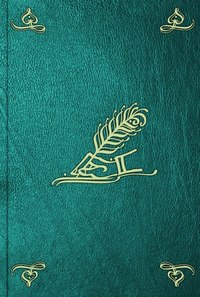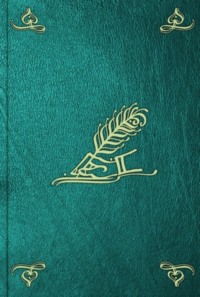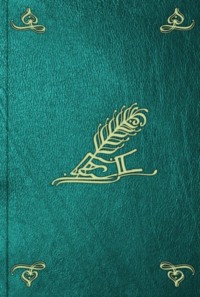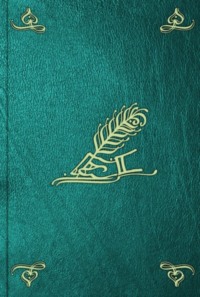The Poems of Schiller — Third period
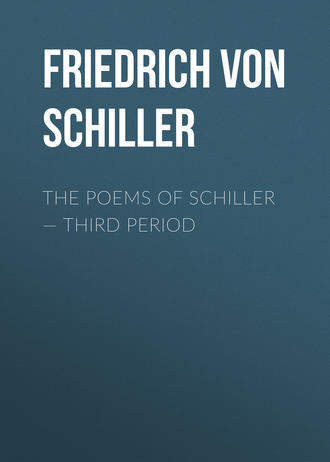 полная версия
полная версияThe Poems of Schiller — Third period
Жанр: зарубежная поэзиязарубежная классиказарубежная старинная литературастихи и поэзиялитература 18 векасерьезное чтениеcтихи, поэзия
Язык: Английский
Год издания: 2017
Добавлена:
Настройки чтения
Размер шрифта
Высота строк
Поля
DITHYRAMB. 9
Believe me, together The bright gods come ever, Still as of old; Scarce see I Bacchus, the giver of joy, Than comes up fair Eros, the laugh-loving boy, And Phoebus, the stately, behold! They come near and nearer, The heavenly ones all — The gods with their presence Fill earth as their hall! Say, how shall I welcome, Human and earthborn, Sons of the sky? Pour out to me — pour the full life that ye live! What to ye, O ye gods! can the mortal one give? The joys can dwell only In Jupiter's palace — Brimmed bright with your nectar, Oh, reach me the chalice! "Hebe, the chalice Fill full to the brim! Steep his eyes — steep his eyes in the bath of the dew, Let him dream, while the Styx is concealed from his view, That the life of the gods is for him!" It murmurs, it sparkles, The fount of delight; The bosom grows tranquil — The eye becomes bright.THE FOUR AGES OF THE WORLD
The goblet is sparkling with purpled-tinged wine, Bright glistens the eye of each guest, When into the hall comes the Minstrel divine, To the good he now brings what is best; For when from Elysium is absent the lyre, No joy can the banquet of nectar inspire. He is blessed by the gods, with an intellect clear, That mirrors the world as it glides; He has seen all that ever has taken place here, And all that the future still hides. He sat in the god's secret councils of old And heard the command for each thing to unfold. He opens in splendor, with gladness and mirth, That life which was hid from our eyes; Adorns as a temple the dwelling of earth, That the Muse has bestowed as his prize, No roof is so humble, no hut is so low, But he with divinities bids it o'erflow. And as the inventive descendant of Zeus, On the unadorned round of the shield, With knowledge divine could, reflected, produce Earth, sea, and the star's shining field, — So he, on the moments, as onward they roll, The image can stamp of the infinite whole. From the earliest age of the world he has come, When nations rejoiced in their prime; A wanderer glad, he has still found a home With every race through all time. Four ages of man in his lifetime have died, And the place they once held by the fifth is supplied. Saturnus first governed, with fatherly smile, Each day then resembled the last; Then flourished the shepherds, a race without guile Their bliss by no care was o'ercast, They loved, — and no other employment they had, And earth gave her treasures with willingness glad. Then labor came next, and the conflict began With monsters and beasts famed in song; And heroes upstarted, as rulers of man, And the weak sought the aid of the strong. And strife o'er the field of Scamander now reigned, But beauty the god of the world still remained. At length from the conflict bright victory sprang, And gentleness blossomed from might; In heavenly chorus the Muses then sang, And figures divine saw the light; — The age that acknowledged sweet phantasy's sway Can never return, it has fleeted away. The gods from their seats in the heavens were hurled, And their pillars of glory o'erthrown; And the Son of the Virgin appeared in the world For the sins of mankind to atone. The fugitive lusts of the sense were suppressed, And man now first grappled with thought in his breast. Each vain and voluptuous charm vanished now, Wherein the young world took delight; The monk and the nun made of penance a vow, And the tourney was sought by the knight. Though the aspect of life was now dreary and wild, Yet love remained ever both lovely and mild. An altar of holiness, free from all stain, The Muses in silence upreared; And all that was noble and worthy, again In woman's chaste bosom appeared; The bright flame of song was soon kindled anew By the minstrel's soft lays, and his love pure and true. And so, in a gentle and ne'er-changing band, Let woman and minstrel unite; They weave and they fashion, with hand joined to hand, The girdle of beauty and right. When love blends with music, in unison sweet, The lustre of life's youthful days ne'er can fleet.THE MAIDEN'S LAMENT
The clouds fast gather, The forest-oaks roar — A maiden is sitting Beside the green shore, — The billows are breaking with might, with might, And she sighs aloud in the darkling night, Her eyelid heavy with weeping. "My heart's dead within me, The world is a void; To the wish it gives nothing, Each hope is destroyed. I have tasted the fulness of bliss below I have lived, I have loved, — Thy child, oh take now, Thou Holy One, into Thy keeping!" "In vain is thy sorrow, In vain thy tears fall, For the dead from their slumbers They ne'er can recall; Yet if aught can pour comfort and balm in thy heart, Now that love its sweet pleasures no more can impart, Speak thy wish, and thou granted shalt find it!" "Though in vain is my sorrow, Though in vain my tears fall, — Though the dead from their slumbers They ne'er can recall, Yet no balm is so sweet to the desolate heart, When love its soft pleasures no more can impart, As the torments that love leaves behind it!"TO MY FRIENDS
Yes, my friends! — that happier times have been Than the present, none can contravene; That a race once lived of nobler worth; And if ancient chronicles were dumb, Countless stones in witness forth would come From the deepest entrails of the earth. But this highly-favored race has gone, Gone forever to the realms of night. We, we live! The moments are our own, And the living judge the right. Brighter zones, my friends, no doubt excel This, the land wherein we're doomed to dwell, As the hardy travellers proclaim; But if Nature has denied us much, Art is yet responsive to our touch, And our hearts can kindle at her flame. If the laurel will not flourish here — If the myrtle is cold winter's prey, Yet the vine, to crown us, year by year, Still puts forth its foliage gay. Of a busier life 'tis well to speak, Where four worlds their wealth to barter seek, On the world's great market, Thames' broad stream; Ships in thousands go there and depart — There are seen the costliest works of art, And the earth-god, Mammon, reigns supreme But the sun his image only graves On the silent streamlet's level plain, Not upon the torrent's muddy waves, Swollen by the heavy rain. Far more blessed than we, in northern states Dwells the beggar at the angel-gates, For he sees the peerless city — Rome! Beauty's glorious charms around him lie, And, a second heaven, up toward the sky Mounts St. Peter's proud and wondrous dome. But, with all the charms that splendor grants, Rome is but the tomb of ages past; Life but smiles upon the blooming plants That the seasons round her cast. Greater actions elsewhere may be rife Than with us, in our contracted life — But beneath the sun there's naught that's new; Yet we see the great of every age Pass before us on the world's wide stage Thoughtfully and calmly in review All. in life repeats itself forever, Young for ay is phantasy alone; What has happened nowhere, — happened never, — That has never older grown!PUNCH SONG
Four elements, joined in Harmonious strife, Shadow the world forth, And typify life. Into the goblet The lemon's juice pour; Acid is ever Life's innermost core. Now, with the sugar's All-softening juice, The strength of the acid So burning reduce. The bright sparkling water Now pour in the bowl; Water all-gently Encircles the whole. Let drops of the spirit To join them now flow; Life to the living Naught else can bestow. Drain it off quickly Before it exhales; Save when 'tis glowing, The draught naught avails.NADOWESSIAN DEATH-LAMENT
See, he sitteth on his mat Sitteth there upright, With the grace with which he sat While he saw the light. Where is now the sturdy gripe, — Where the breath sedate, That so lately whiffed the pipe Toward the Spirit great? Where the bright and falcon eye, That the reindeer's tread On the waving grass could spy, Thick with dewdrops spread? Where the limbs that used to dart Swifter through the snow Than the twenty-membered hart, Than the mountain roe? Where the arm that sturdily Bent the deadly bow? See, its life hath fleeted by, — See, it hangeth low! Happy he! — He now has gone Where no snow is found: Where with maize the fields are sown, Self-sprung from the ground; Where with birds each bush is filled, Where with game the wood; Where the fish, with joy unstilled, Wanton in the flood. With the spirits blest he feeds, — Leaves us here in gloom; We can only praise his deeds, And his corpse entomb. Farewell-gifts, then, hither bring, Sound the death-note sad! Bury with him everything That can make him glad! 'Neath his head the hatchet hide That he boldly swung; And the bear's fat haunch beside, For the road is long; And the knife, well sharpened, That, with slashes three, Scalp and skin from foeman's head Tore off skilfully. And to paint his body, place Dyes within his hand; Let him shine with ruddy grace In the Spirit-land!THE FEAST OF VICTORY
Priam's castle-walls had sunk, Troy in dust and ashes lay, And each Greek, with triumph drunk, Richly laden with his prey, Sat upon his ship's high prow, On the Hellespontic strand, Starting on his journey now, Bound for Greece, his own fair land. Raise the glad exulting shout! Toward the land that gave them birth Turn they now the ships about, As they seek their native earth. And in rows, all mournfully, Sat the Trojan women there, — Beat their breasts in agony, Pallid, with dishevelled hair. In the feast of joy so glad Mingled they the song of woe, Weeping o'er their fortunes sad, In their country's overthrow. "Land beloved, oh, fare thee well! By our foreign masters led, Far from home we're doomed to dwell, — Ah, how happy are the dead!" Soon the blood by Calchas spilt On the altar heavenward smokes; Pallas, by whom towns are built And destroyed, the priest invokes; Neptune, too, who all the earth With his billowy girdle laves, — Zeus, who gives to terror birth, Who the dreaded Aegis waves. Now the weary fight is done, Ne'er again to be renewed; Time's wide circuit now is run, And the mighty town subdued! Atreus' son, the army's head, Told the people's numbers o'er, Whom he, as their captain, led To Scamander's vale of yore. Sorrow's black and heavy clouds Passed across the monarch's brow: Of those vast and valiant crowds, Oh, how few were left him now! Joyful songs let each one raise, Who will see his home again, In whose veins the life-blood plays, For, alas! not all remain! "All who homeward wend their way, Will not there find peace of mind; On their household altars, they Murder foul perchance may find. Many fall by false friend's stroke, Who in fight immortal proved: " — So Ulysses warning spoke, By Athene's spirit moved. Happy he, whose faithful spouse Guards his home with honor true! Woman ofttimes breaks her vows, Ever loves she what is new. And Atrides glories there In the prize he won in fight, And around her body fair Twines his arms with fond delight. Evil works must punished be. Vengeance follows after crime, For Kronion's just decree Rules the heavenly courts sublime. Evil must in evil end; Zeus will on the impious band Woe for broken guest-rights send, Weighing with impartial hand. "It may well the glad befit," Cried Olleus' valiant son, 10 "To extol the Gods who sit On Olympus' lofty throne! Fortune all her gifts supplies, Blindly, and no justice knows, For Patroclus buried lies, And Thersites homeward goes! Since she blindly throws away Each lot in her wheel contained, Let him shout with joy to-day Who the prize of life has gained." "Ay, the wars the best devour! Brother, we will think of thee, In the fight a very tower, When we join in revelry! When the Grecian ships were fired, By thine arm was safety brought; Yet the man by craft inspired 11 Won the spoils thy valor sought. Peace be to thine ashes blest! Thou wert vanquished not in fight: Anger 'tis destroys the best, — Ajax fell by Ajax' might!" Neoptolemus poured then, To his sire renowned 12 the wine — "'Mongst the lots of earthly men, Mighty father, prize I thine! Of the goods that life supplies, Greatest far of all is fame; Though to dust the body flies, Yet still lives a noble name. Valiant one, thy glory's ray Will immortal be in song; For, though life may pass away, To all time the dead belong!" "Since the voice of minstrelsy Speaks not of the vanquished man, I will Hector's witness be," — Tydeus' noble son 13 began: "Fighting bravely in defence Of his household-gods he fell. Great the victor's glory thence, He in purpose did excel! Battling for his altars dear, Sank that rock, no more to rise; E'en the foemen will revere One whose honored name ne'er dies." Nestor, joyous reveller old, Who three generations saw, Now the leaf-crowned cup of gold Gave to weeping Hecuba. "Drain the goblet's draught so cool, And forget each painful smart! Bacchus' gifts are wonderful, — Balsam for a broken heart. Drain the goblet's draught so cool, And forget each painful smart! Bacchus' gifts are wonderful, — Balsam for a broken heart. "E'en to Niobe, whom Heaven Loved in wrath to persecute, Respite from her pangs was given, Tasting of the corn's ripe fruit. Whilst the thirsty lip we lave In the foaming, living spring, Buried deep in Lethe's wave Lies all grief, all sorrowing! Whilst the thirsty lip we lave In the foaming, living spring, Swallowed up in Lethe's wave Is all grief, all sorrowing!" And the Prophetess 14 inspired By her God, upstarted now, — Toward the smoke of homesteads fired, Looking from the lofty prow. "Smoke is each thing here below; Every worldly greatness dies, As the vapory columns go, — None are fixed but Deities! Cares behind the horseman sit — Round about the vessel play; Lest the morrow hinder it, Let us, therefore, live to-day."PUNCH SONG.
(TO BE SUNG IN NORTHERN COUNTRIES.)
On the mountain's breezy summit, Where the southern sunbeams shine, Aided by their warming vigor, Nature yields the golden wine. How the wondrous mother formeth, None have ever read aright; Hid forever is her working, And inscrutable her might. Sparkling as a son of Phoebus, As the fiery source of light, From the vat it bubbling springeth, Purple, and as crystal bright; And rejoiceth all the senses, And in every sorrowing breast Poureth hope's refreshing balsam, And on life bestows new zest. But their slanting rays all feebly On our zone the sunbeams shoot; They can only tinge the foliage, But they ripen ne'er the fruit. Yet the north insists on living, And what lives will merry be; So, although the grape is wanting, We invent wine cleverly. Pale the drink we now are offering On the household altar here; But what living Nature maketh, Sparkling is and ever clear. Let us from the brimming goblet, Drain the troubled flood with mirth; Art is but a gift of heaven, Borrowed from the glow of earth. Even strength's dominions boundless 'Neath her rule obedient lie; From the old the new she fashions With creative energy. She the elements' close union Severs with her sovereign nod; With the flame upon the altar, Emulates the great sun-god. For the distant, happy islands Now the vessel sallies forth, And the southern fruits, all-golden, Pours upon the eager north. As a type, then, — as an image, Be to us this fiery juice, Of the wonders that frail mortals Can with steadfast will produce!THE COMPLAINT OF CERES. 15
Does pleasant spring return once more? Does earth her happy youth regain? Sweet suns green hills are shining o'er; Soft brooklets burst their icy chain: Upon the blue translucent river Laughs down an all-unclouded day, The winged west winds gently quiver, The buds are bursting from the spray; While birds are blithe on every tree; The Oread from the mountain-shore Sighs, "Lo! thy flowers come back to thee — Thy child, sad mother, comes no more!" Alas! how long an age it seems Since all the earth I wandered over, And vainly, Titan, tasked thy beams The loved — the lost one — to discover! Though all may seek — yet none can call Her tender presence back to me The sun, with eyes detecting all, Is blind one vanished form to see. Hast thou, O Zeus! hast thou away From these sad arms my daughter torn? Has Pluto, from the realms of day, Enamored — to dark rivers borne? Who to the dismal phantom-strand The herald of my grief will venture? The boat forever leaves the land, But only shadows there may enter. — Veiled from each holier eye repose The realms where midnight wraps the dead, And, while the Stygian river flows, No living footstep there may tread! A thousand pathways wind the drear Descent; — none upward lead to-day; — No witness to the mother's ear The daughter's sorrows can betray. Mothers of happy human clay Can share at least their children's doom; And when the loved ones pass away, Can track — can join them — in the tomb! The race alone of heavenly birth Are banished from the darksome portals; The Fates have mercy on the earth, And death is only kind to mortals! 16 Oh, plunge me in the night of nights, From heaven's ambrosial halls exiled! Oh, let the goddess lose the rights That shut the mother from the child! Where sits the dark king's joyless bride, Where midst the dead her home is made; Oh that my noiseless steps might glide, Amidst the shades, myself a shade! I see her eyes, that search through tears, In vain the golden light to greet; That yearn for yonder distant spheres, That pine the mother's face to meet! Till some bright moment shall renew The severed hearts' familiar ties; And softened pity steal in dew, From Pluto's slow-relenting eyes! Ah, vain the wish, the sorrows are! Calm in the changeless paths above Rolls on the day-god's golden car — Fast are the fixed decrees of Jove! Far from the ever-gloomy plain, He turns his blissful looks away. Alas! night never gives again What once it seizes as its prey! Till over Lethe's sullen swell, Aurora's rosy hues shall glow; And arching through the midmost hell Shine forth the lovely Iris-bow! And is there naught of her; no token — No pledge from that beloved hand? To tell how love remains unbroken, How far soever be the land? Has love no link, no lightest thread, The mother to the child to bind? Between the living and the dead, Can hope no holy compact find? No! every bond is not yet riven; We are not yet divided wholly; To us the eternal powers have given A symbol language, sweet and holy. When Spring's fair children pass away, When, in the north wind's icy air, The leaf and flower alike decay, And leave the rivelled branches bare, Then from Vertumnus' lavish horn I take life's seeds to strew below — And bid the gold that germs the corn An offering to the Styx to go! Sad in the earth the seeds I lay — Laid at thy heart, my child — to be The mournful tokens which convey My sorrow and my love to thee! But, when the hours, in measured dance, The happy smile of spring restore, Rife in the sun-god's golden glance The buried dead revive once more! The germs that perished to thine eyes, Within the cold breast of the earth, Spring up to bloom in gentler skies, The brighter for the second birth! The stem its blossom rears above — Its roots in night's dark womb repose — The plant but by the equal love Of light and darkness fostered — grows! If half with death the germs may sleep, Yet half with life they share the beams; My heralds from the dreary deep, Soft voices from the solemn streams, — Like her, so them, awhile entombs, Stern Orcus, in his dismal reign, Yet spring sends forth their tender blooms With such sweet messages again, To tell, — how far from light above, Where only mournful shadows meet, Memory is still alive to love, And still the faithful heart can beat! Joy to ye children of the field! Whose life each coming year renews, To your sweet cups the heaven shall yield The purest of its nectar-dews! Steeped in the light's resplendent streams, The hues that streak the Iris-bow Shall trim your blooms as with the beams The looks of young Aurora know. The budding life of happy spring, The yellow autumn's faded leaf, Alike to gentle hearts shall bring The symbols of my joy and grief.

